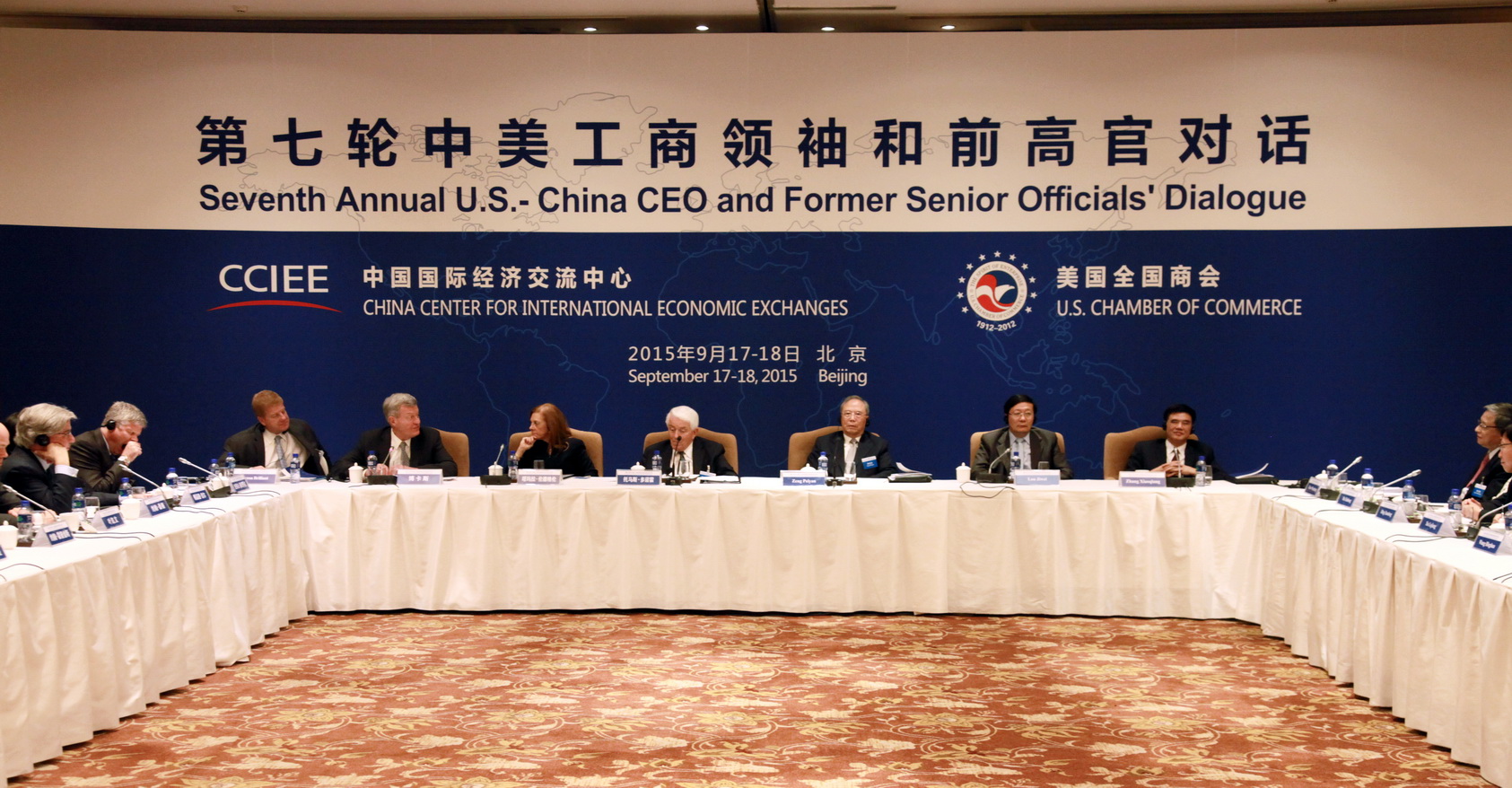Make Joint Efforts to Enhance Trade and Economic Cooperation and Build up Mutual Trust and Common Understanding--The 7th Annual China-US CEO and Former Senior Officials’ Dialogue Held in Beijing
- Time:2015-09-18
- source:CCIEE
The 7th Annual China-US CEO and Former Senior Officials’ Dialogue was held in Beijing from 17 to 18 September 2015. Xi Jinping, General Secretary of the CPC Central Committee, President of the People’s Republic of China and Chairman of the Central Military Commission, met with the US delegates. This session of the Dialogue occurred shortly before President Xi Jinping’s first state visit to the United States. The two sides held candid talks on the economic situation in the two countries, the outlook of bilateral investment treaty (BIT), improvement of business environment, innovation and revolutionary technologies, G20 and global economic governance, international trade, finance, energy revolution and many other topics. Fifteen delegates from each side attended the meeting, including Mr. Zeng Peiyan, Chairman of CCIEE, Mr. Thomas Donohue, President and CEO of the US Chamber of Commerce (USCC) and CEOs, former senior officials and noted scholars from both sides.

The Chinese delegates noted that China has a very clear and transparent development strategy and development path. It strives to modernize national governance by deepening reform and opening up and promoting rule of law and strict discipline of the Party, an effort that will run throughout the process of building a moderately prosperous society in all respects. As a major responsible country committed to the path of peaceful development, China sticks to the principle of mutual benefit and win-win cooperation and assumes international obligations in line with its national strength. It is important that China and the United States deepen mutual understanding, clear up misgivings and misconceptions and strengthen confidence in our friendship and cooperation. Particularly, we must demonstrate our willingness to work for common goals, which bears not only on the immediate interests of the two countries, but also the stable development of the world. We also need to move beyond the “zero-sum game” mentality, face differences squarely with sincere communication and work jointly to send positive energy to the world. It is desirable that China and the US step up practical cooperation in macroeconomic policy coordination, the early conclusion of BIT negotiations, improving investment environment on both sides, fostering new areas of industrial cooperation and strengthening global governance. It is hoped that the US delegates could do more in helping the two countries manage differences, remove misgivings and expand common understanding.
The US delegates stated that the US-China economic and trade cooperation is instrumental in driving innovation and fostering new growth points in areas like ICT, agriculture, energy efficiency and environmental protection technology. China’s G20 presidency next year is an opportunity for the two sides to produce new policy outcomes in finance, healthcare, infrastructure and other areas that could bring benefit to Chinese and US enterprises. The two sides also need to work together to further enhance business and investment cooperation and promote the sound growth of bilateral relations with concrete actions.
After the meeting, CCIEE and USCC issued a Joint Statement. Both sides called upon leaders of the two countries to take concrete steps to further improve bilateral trade and economic relations for mutual benefit, promote more open and inclusive regional economic cooperation, create a policy environment conducive to innovation and open cooperation and deepen cooperation in such areas as energy, climate change, healthcare, infrastructure and financial services. CCIEE and USCC shared the view that to meet the multiple challenges facing the global economy, the two countries should, acting in the interest of the region and the world at large, build a new model of major-country business relationship and strive to become the twin engines of the world economic growth and global governance reform. The two sides also proposed that the following major steps be taken to advance the economic and trade relations between the two sides: (1) strive to conclude BIT negotiations this year; (2) launch a joint study on the bilateral investment and trade treaty (BITT) at an appropriate time and start negotiations on it when conditions are ripe; (3) intensify bilateral efforts regarding China’s potential accession to the TPP and US potential accession to the RCEP; and (4) jointly promote the construction of the Free Trade Area in the Asia Pacific (FTAAP) and create the largest free trade area in the world by around 2030. They also put forth specific recommendations, including (1) promoting two-way investment via a high-standard bilateral investment treaty; (2) promoting trade liberalization and facilitation in the Asia Pacific; (3) promoting market-based approaches to financial reform; (4) promoting innovation and enhancing cooperation on energy, the environment, healthcare, high technology, infrastructure development and connectivity; (5) enhancing agricultural cooperation; and (6) making progress on cyber and information security issues.
Co-hosted by CCIEE and USCC, the Annual China-US CEO and Former Senior Officials’ Dialogue is a “Track II” mechanism for economic exchanges. Six sessions had been held in Beijing and Washington since 2011.
